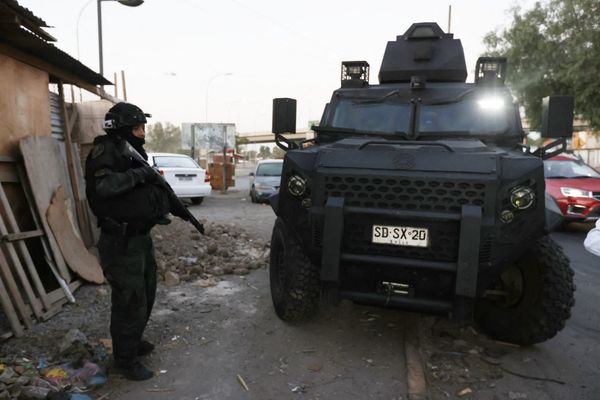
The US supreme court on Monday paved the way for the Trump administration to resume deporting migrants to countries they are not from, including to conflict-ridden places such as South Sudan.
In a brief, unsigned order, the court’s conservative supermajority paused the ruling by a Boston-based federal judge who said immigrants deserved a “meaningful opportunity” to bring claims that they would face the risk of torture, persecution or even death if removed to certain countries that have agreed to take people deported from the US.
As a result of Monday’s ruling, the administration will now be allowed to swiftly deport immigrants to so-called “third countries”, including a group of men held at a US military base in Djibouti who the administration tried to send to South Sudan.
The court offered no explanation for its decision and ordered the judge’s ruling paused while the appeals process plays out. The three liberal justices issued a scathing dissent.
The Department of Homeland Security hailed the decision as a “victory for the safety and security of the American people”.
“DHS can now execute its lawful authority and remove illegal aliens to a country willing to accept them,” spokesperson Tricia McLaughlin said in a statement. “Fire up the deportation planes.”
In response to Monday’s ruling, White House spokesperson Abigail Jackson said: “The supreme court’s stay of a leftwing district judge’s injunction reaffirms the president’s authority to remove criminal illegal aliens from our country and Make America Safe Again.”
In the dissenting opinion, justice Sonia Sotomayor accused the court of “rewarding lawlessness” by allowing the government to violate the due process rights of the immigrants facing removal. She also charged that the conservative majority appeared more concerned by the “remote possibility” that the federal judge exceeded his authority than by “the idea that thousands will suffer violence in far-flung locales”.
“In matters of life and death, it is best to proceed with caution,” she wrote. “In this case, the government took the opposite approach.”
Boston-based US district judge Brian Murphy has faced sharp criticism from Trump and his allies over the decision – part of a pattern of targeting judges who impede the administration’s agenda. In a statement, the White House called him a “a far-left activist judge”.
The case was brought by immigrant rights groups who filed a class-action lawsuit on behalf of a group of migrants seeking to prevent their rapid removal to third-party countries – places where they did not hold citizenship and had no connection.
In May, Murphy found that the Department of Homeland Security had “unquestionably” violated an earlier court order when it attempted to send eight men, all convicted of violent crimes in the US, to South Sudan, a country that the US state department has deemed dangerous for travelers “due to crime, kidnapping and armed conflict”.
Murphy ruled that the Trump administration could not let a group of migrants being transported to countries that were not their own leave the custody of US immigration authorities.
As a result, the plane landed instead in the east African nation of Djibouti, where they have been held at a US military base ever since. The detainees came from countries around the world – Cuba, Mexico, Laos, Vietnam, Myanmar. Only one was from South Sudan. Immigration officials have said that they were unable to return the men to their home countries quickly.
Reuters also reported by that US officials had considered sending migrants to Libya – another politically unstable country previously condemned by Washington for its harsh treatment of detainees. Removing individuals without an opportunity to object would violate his order, Murphy clarified.
In an emergency filing to the supreme court, the administration said the South Sudan-bound migrants had committed “heinous crimes”, including murder, arson and armed robbery.
The case is one of several legal challenges to Trump-era immigration policies to reach the supreme court since Trump returned to office in January vowing to carry out the largest deportation campaign in US history.
In May, the supreme court let Trump end humanitarian programs for hundreds of thousands of migrants to live and work in the US temporarily. The justices, however, in April faulted the administration’s treatment of some targeted migrants as inadequate under US constitution’s due process protections.
Due process generally requires the government to provide notice and an opportunity for a hearing before taking certain adverse actions.
In March, the administration issued guidance providing that if a third country has given credible diplomatic assurance that it will not persecute or torture migrants, individuals may be deported there “without the need for further procedures”.
Without such assurance, if the migrant expresses fear of removal to that country, US authorities would assess the likelihood of persecution or torture, possibly referring the person to an immigration court, according to the guidance.
Murphy found that the administration’s policy of “executing third-country removals without providing notice and a meaningful opportunity to present fear-based claims” likely violates due process requirements under the constitution.
Murphy said that the supreme court, Congress, “common sense” and “basic decency” all require migrants to be given adequate due process. The Boston-based 1st US circuit court of appeals on 16 May declined to put Murphy’s decision on hold.
In his order concerning the flight to South Sudan, Murphy also clarified that non-citizens must be given at least 10 days to raise a claim that they fear for their safety.
The administration told the supreme court that its third-country policy already complied with due process and is critical for removing migrants who commit crimes because their countries of origin are often unwilling to take them back.







